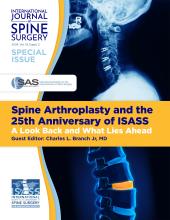ABSTRACT
Background The objective of this study is to compare surgical results (pain, function, and satisfaction) between a group of depressed patients and a nondepressed group who had been operated on for a degenerative lumbar condition.
Methods Prospective observational study. Preoperative pain (lumbar and radicular visual analog scale [VAS]), function (Oswestry Disability Index [ODI]), and depression (Zung depression scale) data were collected in patients listed to be operated on for a lumbar degenerative condition. One year postoperatively, ODI and VAS data were collected again as well as a satisfaction question (are you satisfied with the surgical results? Yes/no).
Results Ninety-seven patients were included in the study, 78 nondepressed patients (80.4%) and 19 depressed patients (19.6%). Preoperatively, depressed patients had more lumbar pain (P = .00) and more functional limitation (P = .01) than nondepressed patients. One year postoperatively, depressed patients had more radicular pain (P = .029) and more functional limitation (P = .03) than non-depressed patients. The overall improvement of pain and function was similar between both groups (not significant). Seventy percent of depressed patients and 80% of nondepressed patients were satisfied with the surgical outcome (P = .52) 1 year postoperatively.
Conclusion Depressed patients experience the same overall level of improvement as nondepressed patients, despite having more pain and functional limitation preoperatively and 1 year after elective lumbar spine surgery than nondepressed patients. The level of satisfaction does not differ significantly between the two groups.
Level of Evidence 2.
Footnotes
Disclosures and COI: No conflict of interest to declare.
- This manuscript is generously published free of charge by ISASS, the International Society for the Advancement of Spine Surgery. Copyright © 2021 ISASS







